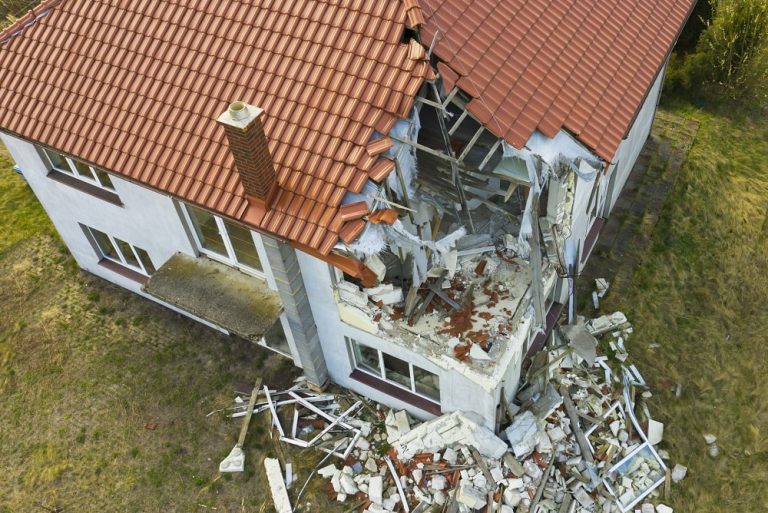You may want to file a renters insurance claim after you’ve experienced damage to your belongings, your home has been broken into or vandalized, or if someone else is injured while visiting your home.
Renters insurance protects your belongings from over a dozen sources of potential damage. Some of the most common ones include fire damage and water damage, as well as theft. If you’re thinking of filing a claim, be sure to check your plan to see that the damage your filing for is covered.
As with any type of policy, you should always consider your renters insurance deductible before filing a claim. In most cases, when the cost of paying your deductible is higher or slightly lower than the cost of the damage or loss to your possessions, your best bet is to pay for their replacement or repair them yourself.
1. Document the Damage
The first step in filing a renters insurance claim is to document the damage or loss as thoroughly as possible. This includes taking pictures or videos, and filing a police report if necessary. Also, one of the most important steps in signing up for renters coverage is to document your possessions.
Making a list of everything you own and how much each item costs will indicate how much coverage you should get. For instance, if you have $20,000 worth of stuff, you should get at least $20,000 worth of personal property protection in your renters policy. That way your policy limits are high enough to cover the full extent of the damage if needed.
Concerning the claims process, this inventory list will also help you identify everything you lost, which you’ll then ask the insurer to reimburse you for. Since you don’t own the property in which you live, you may not have to document the damage to the home, but it’s always a smart idea to do so. That way you can point out the source of the damage and share them with your landlord.
2. Contact Your Insurance Company
After you’ve documented the damage, you should notify your insurance company (and your landlord) of your loss as soon as possible. Your provider will help you initiate the claims process, whether that’s done online or over the phone.
At some point, you’ll have to fill out forms where you’ll indicate what you lost and how much you believe it’s worth. The insurance company will use this information as the basis of your claim. The cost of repairing or replacing your damaged possessions could come from a police report, purchase receipts, or your home inventory, which is why it’s helpful to include these when filing a renters insurance claim.
If you need to make any temporary repairs to keep some damage you’ve sustained from getting worse, you may want to ask your insurance provider first. If they’re thinking of sending an adjuster out, the adjuster will want to see the damage as close to the way it was initially discovered as possible.
3. Receiving an Adjuster and Completing Your Claim
This brings us to the next step in the process. Once you’ve filed a renters insurance claim with your provider and they’ve determined the claim is valid, they may send an adjuster out. This is likely in cases of liability or property damage.
The adjuster will go over all the information you’ve compiled already, as well as ask some more questions if needed. If there’s property damage involved, the adjuster will probably want to examine it.
Then, based on the adjuster’s findings, the insurance company will wrap up the claim. At this point, you’ll be issued payment for the value of your loss, minus the cost of your deductible.
Filing a Renters Insurance Claim Without Receipts
When you file a renters claim for personal property, your insurer will ask you what’s missing and how much those items cost. To know how much they cost, it’s very helpful to have a home inventory list. This way, you can keep track of your purchases and know the value of your items.
If you don’t have a home inventory list, or you don’t keep receipts for the things you have to know their value, it’s not the end of the world. An insurance company can use pictures or videos you may have of your things to help recover them. Also, looking through your credit or debit card statements may help you determine how much you paid for an item.
Just remember, the more information you provide to your insurer when filing a claim, the better. It’s possible to receive a payout when filing a renters insurance claim without receipts, it just may take longer and may not go as smoothly.
How Long Does It Take For a Renters Insurance Claim to Complete?
It varies on the type of claim, but a property loss claim would likely take a shorter amount of time than a liability claim. States sometimes mandate how long you have to file a claim and how long the insurance company can take to get back to you, but there aren’t usually rules for how long an insurance company can take to settle a claim.
For instance, providers usually have 10-15 days to respond to a claim. This is the case in Florida, Georgia, Illinois, and New York. After they notify you that a claim is settled, they may have between 10-30 days to deliver the payment to you. But, there is a gray area in the middle to allow for the claim to be investigated. This is because every claim is different, and it’s hard to know how long it’ll take to examine and complete one.
How Does a Renters Insurance Claim Work?
If you’ve suffered a loss and you want your insurance company to cover the damage, you’ll need to file a claim. A renters insurance claim works the same way as other claims in that your insurer will approve or deny it and likely send an adjuster out to determine exactly how much to reimburse you.
A renters insurance claim can be filed for damage due to a covered peril, like theft or fire damage, or for personal liability. In every instance of damage, your insurer will review the claim to see if you’re fit for payment. When filing, be aware of your deductible and limits. Your provider won’t help you if the damage is less than your deductible, and they won’t pay you more than what your limits allow.
Once you’ve suffered the loss, contact your carrier as soon as you can. Insurance companies have time frames for when you can file a claim. With renters claims, you may have as little as a few days after the incident occurred.
Does Renters Insurance Increase After a Claim?
It varies by insurer and by claim severity, but a renters insurance claim could increase your rate. This is because if you file one claim, you’re more likely to file another than someone who has never filed one. To offset this increased risk, a carrier might raise your premium.
Companies weigh claims differently, though. For instance, your insurer could recognize that one burglary claim in four years of coverage might be a freak incident, and your rate won’t increase. But, if you’ve filed two or three renters claims seeking compensation for water damage, your provider might realize there’s some sort of issue there, and they could increase your premiums as a result.
Generally, the rule is the more claims you file, the higher your rate will become. Filing too many claims in a short period could cause your provider to not renew your policy, too.
Be sure to ask your insurance company what the effect of filing a renters claim could be since it varies by carrier. Some companies state they won’t increase premiums after a claim, and sometimes a single claim might not increase your rate at all.
Renters Insurance Claim Tips
Hopefully, you never need to file a claim. But, if you have to, you want to do it right. Here are some tips to think about when filing a renters insurance claim:
Understand your coverage. You should have a good understanding of your policy so you can roughly know what to expect when filing a claim. Know your policy’s limits, be aware of what perils are or aren’t covered, and recognize if you have actual cash value or replacement cost coverage. If certain high-value things you own exceed individual item policy limits, you may want to get scheduled personal property coverage.
Keep your deductible in mind. The deductible is the amount you have to pay before your insurer steps in to take care of the rest of the cost. If the damage you’ve incurred is less than your deductible amount, your provider won’t help you. If the damage is only slightly more than your deductible, it may not be worth it to file a claim as it may raise your rate.
Work with, not against, your adjuster. When you file a renters insurance claim, you’ll likely meet with an adjuster at some point in the process. The adjuster is the primary link between you and the insurance company.
Being cordial and friendly to the adjuster will make the claims process smoother, and it can only help your chances of a positive outcome. Also, be as specific and detailed as possible in your claim. The more information you provide, the better your insurance company can help you.
The editorial content on Clovered’s website is meant to be informational material and should not be considered legal advice.




